Vaeira: Jewish Take-out
Vaeira is another one of those sections of Torah that sounds familiar to us – mostly because of our annual re-telling of this story. It all sounds very familiar: our ancestor’s servitude in Egypt, the recounting of the 10 plagues, Pharaoh’s hardened heart. One almost wants to break out into a raucous Dai Dai-einu and toss a few marshmallows around the room (for hail).
If anyone ever doubts our Jewish agrarian roots, have you noticed how many times and in how many places goats turn up? Even in our traditional marriage contracts, or ketubot, the bride, the kallah gives and is in turn, promised a certain amount (100 zuzim) if the marriage should dissolve. We don’t really know today what the value of azuz would be today, but we can guess. At the end of our Pesach Seder as we sing “Chad Gadya” we sing that 100 zuzim would be enough to buy 50 goats. “My father bought for 2 zuzim, chad gadya (one little goat).” Based on that information, we can calculate that 50 or 100 goats would keep most women in clothing and shelter for awhile!)
Back to Vaeira: God effectively verb-alizes His promise to Moses. Hence the four verbs of redemption: Take out, Deliver, Redeem and Acquire. While it is difficult not to think of the first two of these promises as Chinese take-out — otherwise known as Xmas Day dinner — altogether these four verbs sum up God-as-a-Be-coming God to all the Children of Israel and not just a private promise to Moses.
In His guise as a Burning Bush, God assures Moses that He will always be at the side of Moses. As we saw last week, Moses is not easily convinced, and he argues relentlessly with God about his lack of suitability for this job. It is almost as if his heart too was hardened – well prior to God hardening the heart of Pharaoh, a section of Torah that we all stumble over. So just who is hardening whom? And why? Moses finally relents, but one senses that his heart is certainly less than enthusiastic about being seconded by God. The peaceful shepherd leaves the hills of Midian and goes back into the torpidity of Mitzrayim.
Pharaoh, of course, is not interested in losing his workforce, regardless of the demands of their God. What’s a Pharaoh/god to do but refuse these early asks in Vaeira, regardless of the ensuing plagues. His sorcerers have already effectively hardened Pharaoh’s heart – he is a jaded man/god and cannot be seduced by mere illusion. If we step out of the drama of plagues for an instant, (join me, stage right), we read in Torah and in the V’ahavta prayer, that God demands a softening of our hearts with the words of Torah. 36 times we are commanded to be kind to the stranger, for we too were strangers in Mitzrayim. Our work as Jews, it would seem, is to not consider the strange/other a stranger, but to face that stranger with the same degree of openness that we welcome those familiar to us.
This past Shabbat we had guests for an early supper – I had thought they were coming the following week, but found out at the very last minute they were coming within 30 minutes! I flew around the house, thawing soup, clearing the table, whipping up a batch of scones – with such joy and anticipation. We hadn’t seen this family for two years – I was so full of love, and yet today I wonder would I have dropped everything with such joy for a stranger needing some soup?
Sometimes I gestalt Torah as I read Torah. I find it useful to consider the story from all angles, to become all players, if you will. So, today, I am Pharaoh sitting on my gilt throne, staring at this man-almost-my-grandson. I adopted you, I think to myself, I took you in, my daughter loved you as her son, and you rejected my daughter, me, and all that I have. Why should I even listen to you? I am Moses: I look up and see your cruel stern face. You were kind to me, but to my people you showeda hard-heartedness beyond anything you ever showed me. Who are you? You are my grandfather in name only. I am God: I look down at my children, their hearts are colliding. Iron will-refusal-of-a shared-past meets strength-of-hope-in an-uncertain future.All are caught in a rusting chain of wills. And I am now the River running red with blood; the blood of all the babies I swallowed, the blood of the women who cleansed themselves, I am the blood of death, the blood of life. I am the River. I am.
This drama we read in Vaeira will continue, but today, let’s pause here. Let’s reflect on our own granite-heartedness, and ask ourselves: Where am I implacable? Where can I just not give any further? When do I say, never again? What will push me into be-coming and not just be-ing? And if not now, when?
At our Pesach Seder we eat a Hillel sandwich. This is what Hillel did when the Temple existed: He ate the Paschal lamb, the matzo and the bitter herbs as one, in fulfillment of the verse, “with matzot and maror they shall eat it”(Numbers 9:11).
With that bite of maror, of bitterness, we remember our obligations of freedom. Just as Shabbat is that added spice that makes our Shabbat meals so delicious, so too is bitterness our essential herb of memory. Shabbat shalom.
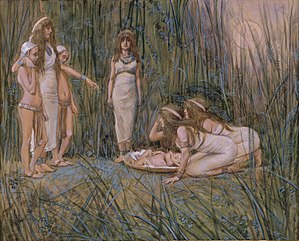 This week, we have shifted from the first to the second book in the Five Books of Moses, or our Written Torah. We have left Bereshit, Genesis and are now in the book of Shemot, or Exodus. We have also shifted from the stories of our Avot and Imahot, our patriarchs and matriarchs, – Avraham, Yitzhak and Yaakov, Sarah, Rivka, Rachel and Leah – into the story where the two main protagonists are God and Moses. We will follow these two “actors” throughout the rest of Torah.
This week, we have shifted from the first to the second book in the Five Books of Moses, or our Written Torah. We have left Bereshit, Genesis and are now in the book of Shemot, or Exodus. We have also shifted from the stories of our Avot and Imahot, our patriarchs and matriarchs, – Avraham, Yitzhak and Yaakov, Sarah, Rivka, Rachel and Leah – into the story where the two main protagonists are God and Moses. We will follow these two “actors” throughout the rest of Torah.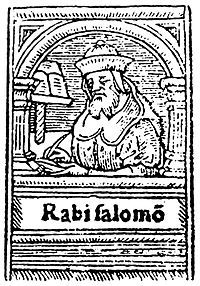
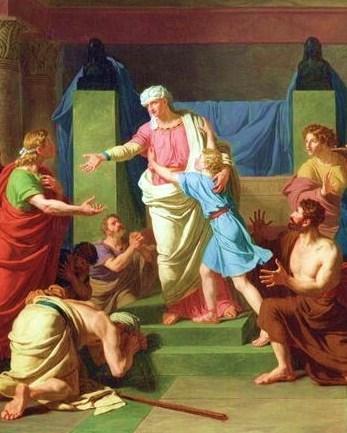 Vayigash takes its name from the “approach” of Judah to Joseph– as he pleads with the Egyptian governor for mercy. To approach someone when there is such a power differential is an approach that demands careful consideration. Too hasty, too obsequious, too brash, too cautious – any of these may cause the person who is the power-that-be to consider negatively that which is being asked. Just where to pitch the “ask” is the stuff of many an ad agencies nightmares – and many an educator’s planning of class materials. What is too much – and what is too little?! When is it “just right?” Perhaps Goldilocks was taking her cue from Judah.
Vayigash takes its name from the “approach” of Judah to Joseph– as he pleads with the Egyptian governor for mercy. To approach someone when there is such a power differential is an approach that demands careful consideration. Too hasty, too obsequious, too brash, too cautious – any of these may cause the person who is the power-that-be to consider negatively that which is being asked. Just where to pitch the “ask” is the stuff of many an ad agencies nightmares – and many an educator’s planning of class materials. What is too much – and what is too little?! When is it “just right?” Perhaps Goldilocks was taking her cue from Judah.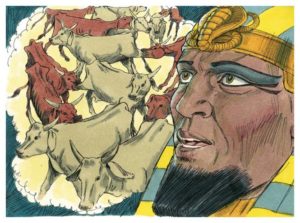 Thus says the Lord: I will betroth you to Me forever.
Thus says the Lord: I will betroth you to Me forever.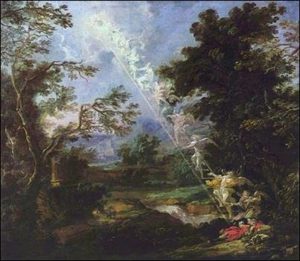 Shalom Aleichem. There was a chassid who used to travel a great distance to be with his Rebbe, chassidic master Rabbi Aaron of Karlin. Once, while making his journey, he was asked why he couldn’t find a Rebbe who lived closer to his own town.
Shalom Aleichem. There was a chassid who used to travel a great distance to be with his Rebbe, chassidic master Rabbi Aaron of Karlin. Once, while making his journey, he was asked why he couldn’t find a Rebbe who lived closer to his own town.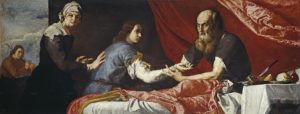 In the early twentieth century a man was brought to Rabbi Avraham Yitzhak Kook. This father had given his son a good Jewish education, he tried to set a good example, and he kept the mitzvot. Now, however, his son had drifted away from Judaism; he no longer kept mitzvot, he did not even identify as a Jew any more. What should he do? Rav Kook asked the father, “Did you love him when he was religious?” “Of course.” “Now,” Rav Kook replied, “love him even more.”
In the early twentieth century a man was brought to Rabbi Avraham Yitzhak Kook. This father had given his son a good Jewish education, he tried to set a good example, and he kept the mitzvot. Now, however, his son had drifted away from Judaism; he no longer kept mitzvot, he did not even identify as a Jew any more. What should he do? Rav Kook asked the father, “Did you love him when he was religious?” “Of course.” “Now,” Rav Kook replied, “love him even more.”
Bo
January 7, 2019 by Rabbi Lynn Greenhough • From the Rabbi's Desk
Shalom Aleichem,
Surprise – a simple black maillot was purchased, and now, well cooled by the frigid air conditioning, we drove a few more miles, parked our pickup truck (one of only two we saw our entire time in LA), and walked around the back to the pool. Imagine my second degree of shock and surprise when all the lovely ladies were floating in the water, au naturelle. Turns out I didn’t need that bathing suit after all. Maybe this was God giving me a sign I should not shop on Shabbos!
At any rate, all of this is mere background to the word “Bo.” Whilst we were floating in the pool, Aaron noticed a small pack of dogs racing around a very large back yard compound. He asked our friend (originally from Winnipeg) about the dogs and it turned out that the cute little terrier was a stray they hadbrought back from their last trip to Israel. Aaron called out, “Bo!”(Come) and the dog screeched to a stop. He looked around, very excitedly, and Aaron called “Bo” again. The dog almost ran into the pool! Such is the power of mamaloshen, the mother-tongue. Even the dog was thrilled to hear Hebrew spoken again.
In our reading this week, God is saying to Moses the word Bo.“Come to Pharaoh, for I have made his heart hard.”And so in Bo we again encounter a God who decides to, “amuse Myself with Egypt” – all with an eye to Moses (and us) repeating what will eventually happen to our children and our children’s children. I don’t know how much Hebrew Moses knew. He grew up in Egypt, then recused himself to the hills of Midian – I am not sure the word Bo was as electrifying for Moses as it was for our little dog in LA. And why should Moses go to Pharaoh if God is so clearly toying with the Egyptian leader – what is in it for Moses? Other than a good story eventually – which as my opening will attest, is always money in the bank.
In Bo, we will read of the final three plagues – culminating in the death of the first-born, which leads Pharaoh, in a heart-broken rage, to banish the people Israel from his land. In the dark of the night, the angel of death “passed over” each household where the lintel was painted with blood, and thus the people left this land of servitude and hardship. Not the most auspicious of leave-takings.
In some ways the people at this point resembled that mongrel dog. They were hungry, worked to death, and probably had very little hope of any redemption. But saved they would be.
Moses was challenged from the beginning of his story. Early on in Shemot after he kills the Egyptian overseer, he is addressed defiantly, in words that archly foretell the up-coming challenge from his cousinKorach: “Who made you a man, a ruler, and a judge over us?” Moses is in that classic middle manager position – caught in a vise grip between the people, embittered and edgy, and an equally, at times, bad-tempered God. At this stage, God can seem to be a vengeful and almost frivolous God, seemingly toying with a people to see how far He can push them.
Moses can’t please the people and he can’t, seemingly, please God. Oiy, such rachmanes, compassion, I have for him.
Bo – a one syllable command – as commands tend to be. Interestingly, the word Bo is modified by a disjunctive trop symbol, a tipcha, indicating a small pause after the word is sung – perhaps this mixed message (Come-but-pause) also connotes a mixed sense of how everyone is to proceed.
Bo, kinder, do me a mitzvah. Come with me, children, says God, and I will give you a story for all time. A story of freedom that the whole world will tell, a story so that all people, for all time will know, “I am HaShem.” Sometimes Bo is just Bo. Sometimes Bo evokes a world of memories. And sometimes Bo opens a door to an unimagined future. Bo. Past, present and future, Ehyeh asher ehyeh, I am Bo. I am Be-coming..
Aleichem shalom.